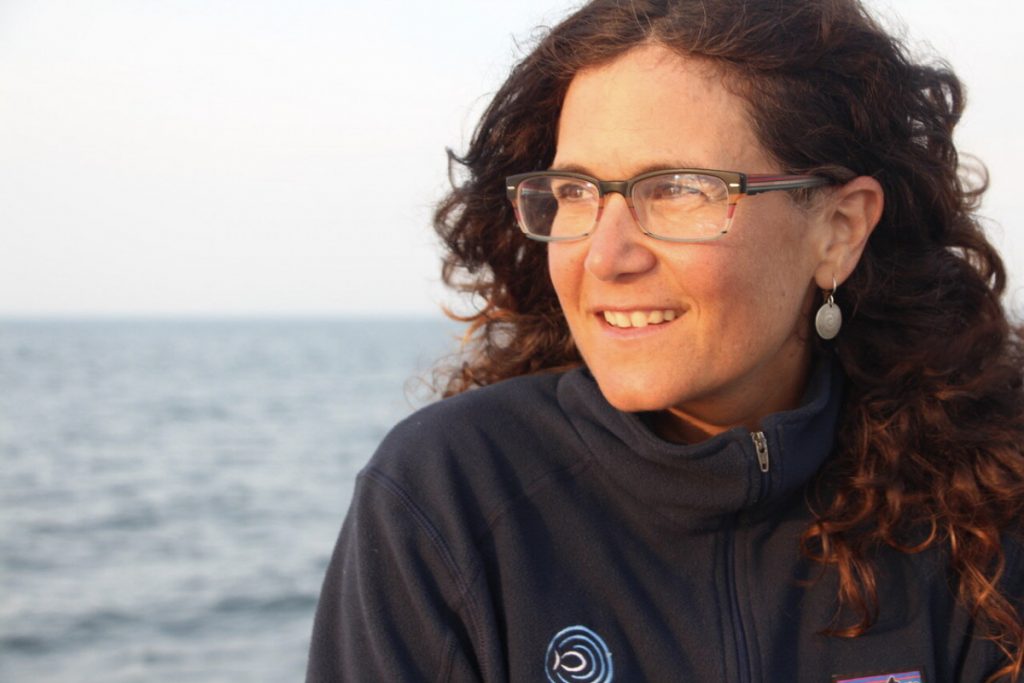
Emma Francois
Contributing Writer
Rachael Zoe Miller exists to protect oceans.
“That’s my job,” she said. “That is why I’m on the planet.”
Part of that work is connecting others, through science, conservation, sports, and art, to the water sources near them. Sometimes that’s a snow-capped mountain, other times it’s a glacier-made freshwater lake like ours, as was the case last summer when she took to the Amphitheater stage as part of the morning lecture series during Week Eight, presented in partnership with National Geographic, titled “Water: Crisis, Beauty and Necessity.”
Miller — expedition scientist, inventor and NatGeo explorer — will be returning to Chautauqua for a trio of events, all leading up to the launch of her debut book which she, ever the multi-hyphenate, researched, wrote and illustrated.
First, at 3:30 p.m. today in Smith Wilkes Hall, Miller will deliver her lecture, “Microplastics: Solutions to Save Our Seas” in which she’ll provide a hopeful talk sharing some of her favorite ways to mitigate marine debris from around the world. Following that, at 5 p.m. today in the Hall of Christ Sanctuary, Miller will lead a workshop for children and adults titled “Microfibers in a Whole New Light: See What You’re Breathing and How to Protect Yourself,” a hands-on look at how the very clothing you’re wearing impacts the planet.
And finally, at 12:15 p.m. Thursday in the Literary Arts Center at Alumni Hall Ballroom, Miller will officially launch her book, Decision-Making in the Age of Plastics: A Choose-Your-Own-Adventure Style Guide to Purchasing While Balancing Your Health, the Planet and Your Budget, copies of which are available for purchase at the Chautauqua Bookstore.
“Chautauqua was my first choice for launching the book — not just because of the incredibly warm welcome, astute questions, and enthusiasm for protecting the planet I received and observed last year,” Miller said. “If there is ever a place to drop a figurative stone in the water — in this case, that stone is a mixture of science, conservation, action and stories — and watch the ripples flow, this is it.”
As the founder of the Rozalia Project for a Clean Ocean, co-inventor of the microfiber-catching laundry hack Cora Ball, and Explorers Club Fellow, Miller has spent over 15 years studying our planet’s vast waterways and fielding questions from those eager to be a part of the solution to minimize microplastics and save our seas. While these conversations have been impactful and meaningful — indeed, such talks last summer with Chautauquans galvanized her to finish her book — she wanted to devise a system to help people make decisions on a larger, but just as personable, scale.
Her solution was to create a choose-your-own-adventure style book, inspired by the ones she read as a child, complete with playful sketches and compassionate writing that gives the book a familiar, approachable feel, while also serving as a tool readers can reach for again and again.
“It is totally giving people agency,” Miller said. “I have included the most up-to-date science in a palatable way that specifically relates to the path that they’re going down.”
This could mean choosing between a wool and polyester fleece to keep warm in winter, or deciding which laundry detergent suits your budget, needs and environmental concerns — everyday decisions that have massive and long-term implications on our communities’ health and sustainability, said Mark Wenzler, Peter Nosler Director of the Chautauqua Climate Change Initiative.
“At a time of rising concern about microplastics in our oceans and bodies, the global treaty to reduce plastic pollution collapsed last week due to opposition from petroleum and plastics-producing countries,” Wenzler said. “For the foreseeable future, it will fall to all of us to reduce plastics and protect the health of our planet and ourselves. That’s precisely what Rachael Miller wants to help us do through her new book, Decision-Making in the Age of Plastics.”
As someone who sees large, seemingly endless bodies of water and wants to jump in, heart first, Miller is no stranger to vast, uncertain depths. In the face of this, she is a fierce proponent of the power of one.
As Miller put it: “Everyone who wears and launders clothing is part of this problem. But everyone who wears and launders clothing can be part of the solution.”




